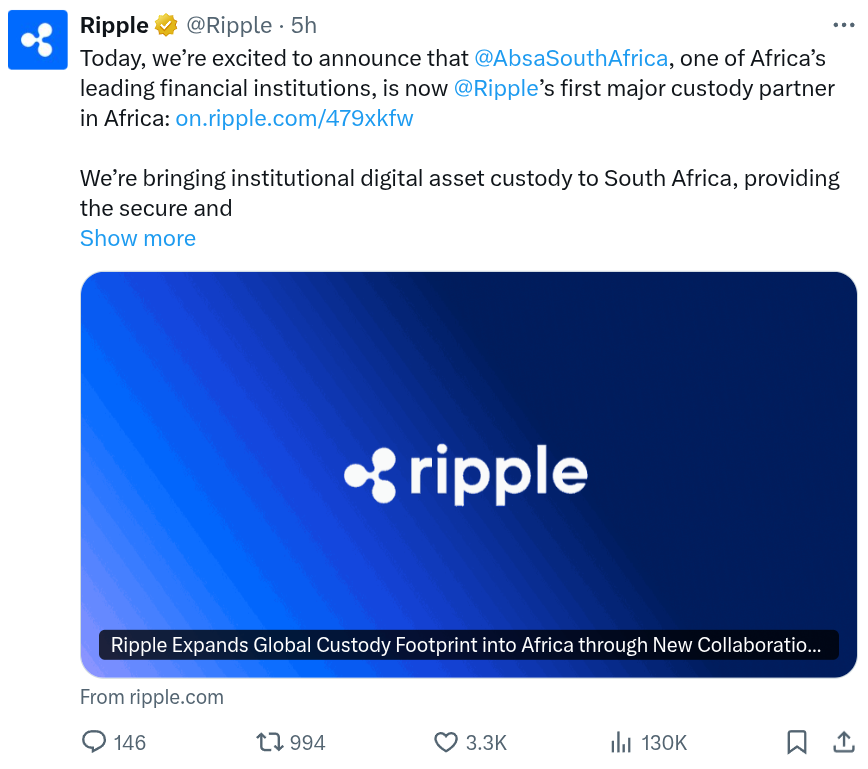
Ripple has formed a partnership with Absa Bank in South Africa to deliver digital asset custody solutions, thereby extending its network of institutional custody services across the continent.
According to the announcement, this collaboration marks Ripple’s first significant custody alliance in Africa. Clients of Absa will benefit from digital asset custody services powered by Ripple’s advanced infrastructure designed for tokenized assets and cryptocurrencies.
Absa Bank plays a crucial role in the African financial sector, overseeing roughly 2.07 trillion South African rands ($119.5 billion) in assets by the close of 2024, alongside generating $6.34 billion in revenue last year.
Ripple’s statement indicated that this partnership emerges from a notable rise in demand for secure and compliant digital asset infrastructure particularly in emerging markets. Reece Merrick, Ripple’s managing director for the Middle East and Africa, mentioned that this alliance exemplifies Ripple’s dedication to harnessing the potential of digital assets within the region.
This collaboration broadens Ripple’s reach in Africa. In March, the company formed a partnership with Chipper Cash, a local payment infrastructure provider, to facilitate crypto-enabled cross-border transactions.
Additionally, last month, Ripple launched its Ripple USD (RLUSD) stablecoin in Africa, implementing distribution through partnerships with Chipper Cash, crypto exchange VALR, and crypto payment service Yellow Card. Jack McDonald, Ripple’s senior vice president of stablecoins, revealed that RLUSD is being distributed throughout the continent via local partners.
 Source: Ripple
Source: Ripple
Related: BlackRock aims for Bitcoin yield in new ETF as a sequel to IBIT
Ripple’s Custody Focus
Ripple filed for a trademark related to its custody services back in mid-March and has actively begun to attract institutions as its customers. The custody service was introduced nearly a year ago, targeting banks and financial technology companies.
Following its acquisition of Standard Custody last summer, Ripple has made significant strides in this space. Recently, they partnered with Bahrain Fintech Bay to implement their custody solution along with the RLUSD stablecoin in Bahrain’s financial institutions. Earlier this month, Ripple also agreed to provide crypto custody services for Banco Bilbao Vizcaya Argentaria in Spain.
Moreover, South Korean crypto custodian BDAas launched institutional support for XRP after its partnership with Ripple aimed at leveraging custody services. Ripple’s initiatives go back even further, having partnered with HSBC in late 2023 to establish a custody platform focused on tokenized securities.
Related: DBS and Franklin Templeton join forces with Ripple for tokenized lending
Increased Intersection of Traditional Finance and Crypto
The links between traditional finance and cryptocurrency are strengthening. For example, BlackRock’s innovative crypto products have contributed to substantial quarterly earnings. Furthermore, their recently launched spot Bitcoin ETF reportedly generated nearly $245 million in fees over the past year.
Prominent wealth manager Morgan Stanley recently informed its advisors that all clients will have access to cryptocurrency funds. BNY, the largest custodian bank globally, is exploring tokenized deposits to permit real-time fund transfers.
Nations are also beginning to engage with crypto. Recently, Luxembourg’s sovereign wealth fund allocated 1% of its portfolio to Bitcoin ETFs, following Norway’s sovereign wealth fund that scaled its indirect Bitcoin exposure by 192% last year.
Additionally, the Czech National Bank increased its holdings in Coinbase, and a member of the Swedish parliament urged for a “budget-neutral” Bitcoin reserve this spring. In February, the Czech National Bank considered developing a Bitcoin test portfolio, advocating for a measured approach to the asset.
Magazine: Japan explores XRP Ledger, USDC, and USDT payments via Grab: Asia Express



